It is ironic that in its exuberant abandonment of the conventional trappings of Beijing opera, Contemporary Legend Theatre’s (當代傳奇劇場) 108 Heroes (水滸108), first brought to the stage in 2007, has managed to preserve one of Chinese opera’s core values: entertainment. An operatic performance that includes cosplay fashion, street dance and rock music from a live band is necessarily going to alienate some people, but by drawing on the vitality of modern youth culture, it has also opened doors into an older tradition that many young people today would otherwise never think of exploring.
The success of the production in 2007 led to financial support from the Hong Kong Arts Festival to produce a sequel. (108 Heroes had originally been envisaged as a trilogy, but given the costs of such a big production, no timeline had been drawn up.) 108 Heroes II — The Hall of Righteousness (水滸108II︰忠義堂) premiered in Hong Kong in March to considerable critical acclaim, and will open in Taipei on Thursday for four shows. The same creative team led by Contemporary Legend’s founder Wu Hsing-kuo (吳興國), including contemporary novelist and literary figure Chang Ta-chun (張大春), who wrote the script, and pop idol and composer Emil Chow (周華健), who has provided songs and music, are set to burnish this second installment of 108 Heroes to an even brighter contemporary gloss than the first.
108 Heroes is based on a classical novel that has been popular since the 14th century. It is widely known by the English titles of Outlaws of the Marsh or The Water Margin and has been adapted in innumerable media, from comic book to animation to computer game, and though it features a vast array of characters and incidents, most of these are familiar to Chinese audiences from long, even if superficial, acquaintance. This familiarity has allowed the production team greater freedom than would be acceptable in a less well-known work, and Chang has once again been able to cram about a third of the novel into a 130-minute production. The story is told in reverse and through a series of flashbacks, montage and nested narratives, forgoing the linear simplicity of conventional Chinese opera. Large-format projections onto the back of the stage, a live rock band backing up the traditional string and gong orchestra, and costumes heavily influenced by cosplay and the design motifs of Japanese anime and Taiwan puppet theater from Lai Yi-wu (賴宜吾) — whose costume design garnered universal praise in Hong Kong as an undisputed highlight of the show — make this production unlike anything in the world of Chinese opera.
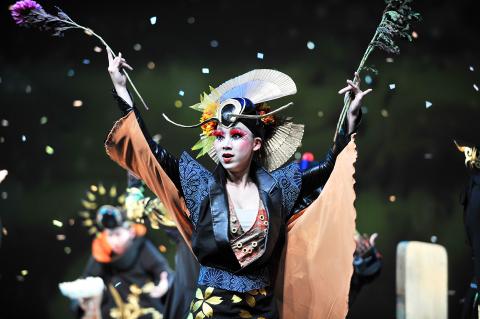
Photo by Patrick Leung, courtesy of CLT
In 108 Heroes, Contemporary Legend reinterprets Chinese opera in a manner that differs considerably from other high-profile international reworkings of the genre in recent years. The only similarity between it and two quite different productions of The Peony Pavilion — Chen Shizheng’s (陳士爭) historically informed recreation (commissioned by New York’s Lincoln Center) and Kenneth Pai’s (白先勇) rather Disneyfied adaptation — is a willingness to shun aging divas for the leading roles in favor of age-appropriate casting. Both the other productions brought youth back into opera, but nowhere approaching the manner of 108 Heroes, which aims not only to feature young talent, but also to bring a youthful sensibility back into an artistic form that was the pop culture of its era.
This second installment of 108 Heroes aims to be bigger and more vibrant than the first, and Contemporary Legend has filled its ranks with emerging talent from the Theater and College of Chinese Opera, Shanghai Theater Academy (上海戲劇學院戲曲學校). It is hoped that the abundance of young people on stage, injecting their own brand of creativity into the venerable tale of outlaws fighting for righteousness against a corrupt government, will attract younger audience members.
Wu is very much wedded to the idea of building an immersive theatrical experience through the use of both multimedia and the highlighting of traditional types of spectacle, including acrobatics and old-fashioned circus tricks. Some physically demanding set piece battles provide ample opportunity for young performers to show off their acrobatic skills, with much of the demanding singing parts taken care of by more experienced cast members.
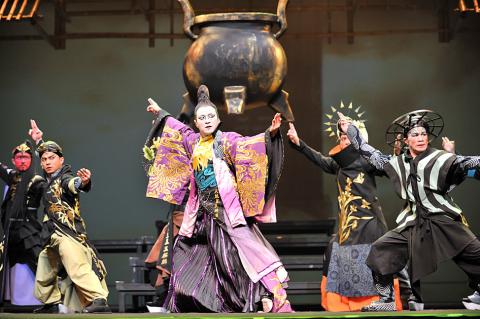
Photo by Patrick Leung, courtesy of CLT
In the first installment, Wu stepped back and allowed all the major roles to be taken by young aspiring performers, but with The Hall of Righteousness he takes the stage in the main role of Song Jiang (宋江). The experience of such an established performer is likely to give the central role a greater solidity, though it remains a question whether combining the responsibilities of director and performer is the right choice. His presence will certainly provide the necessary experience in subtler aspects of lyrical phrasing and stage presence to anchor the host of young performers shifting between martial operatic forms and the more fluid movements of street dance and hip-hop.
If 108 Heroes II proves nothing else, it shows that there is still a youthful vitality in Chinese opera. The first installment was so bold in its ambitions that it could not but have some rough edges, and with this second installment, Contemporary Legend has upped the ante to such a degree that one can only applaud the company’s fearlessness in venturing into terrain that only the boldest will dare to tread.
Come what may, 108 Heroes II — The Hall of Righteousness will be a revelation.
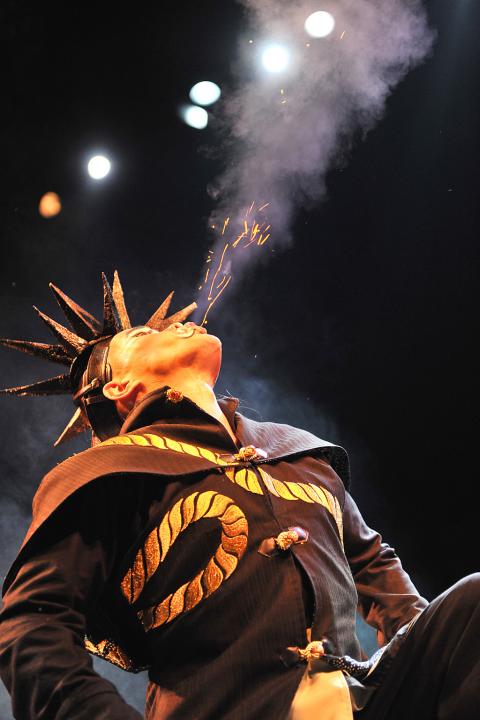
Photo by Patrick Leung, courtesy of CLT
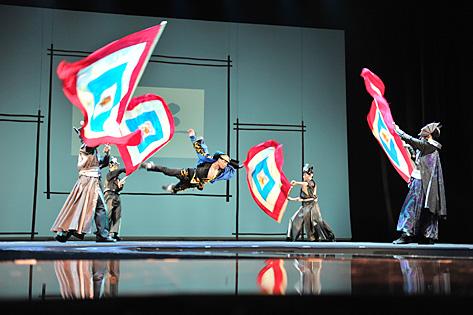
Photo by Patrick Leung, courtesy of CLT
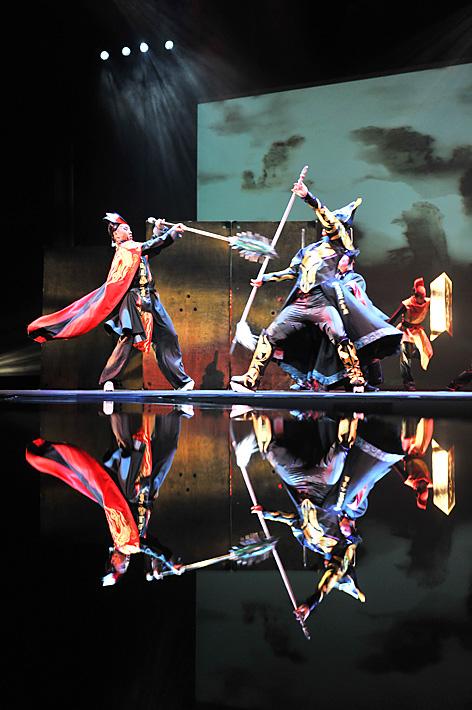
Photo by Patrick Leung, courtesy of CLT
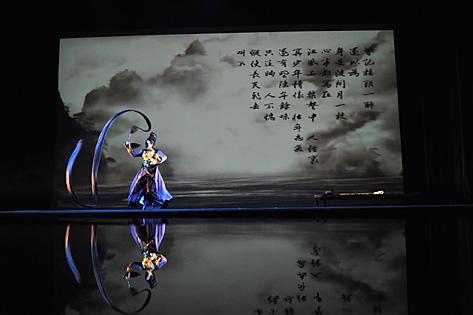
Photo by Patrick Leung, courtesy of CLT

In the March 9 edition of the Taipei Times a piece by Ninon Godefroy ran with the headine “The quiet, gentle rhythm of Taiwan.” It started with the line “Taiwan is a small, humble place. There is no Eiffel Tower, no pyramids — no singular attraction that draws the world’s attention.” I laughed out loud at that. This was out of no disrespect for the author or the piece, which made some interesting analogies and good points about how both Din Tai Fung’s and Taiwan Semiconductor Manufacturing Co’s (TSMC, 台積電) meticulous attention to detail and quality are not quite up to

April 21 to April 27 Hsieh Er’s (謝娥) political fortunes were rising fast after she got out of jail and joined the Chinese Nationalist Party (KMT) in December 1945. Not only did she hold key positions in various committees, she was elected the only woman on the Taipei City Council and headed to Nanjing in 1946 as the sole Taiwanese female representative to the National Constituent Assembly. With the support of first lady Soong May-ling (宋美齡), she started the Taipei Women’s Association and Taiwan Provincial Women’s Association, where she

Chinese Nationalist Party (KMT) Chairman Eric Chu (朱立倫) hatched a bold plan to charge forward and seize the initiative when he held a protest in front of the Taipei City Prosecutors’ Office. Though risky, because illegal, its success would help tackle at least six problems facing both himself and the KMT. What he did not see coming was Taipei Mayor Chiang Wan-an (將萬安) tripping him up out of the gate. In spite of Chu being the most consequential and successful KMT chairman since the early 2010s — arguably saving the party from financial ruin and restoring its electoral viability —

It is one of the more remarkable facts of Taiwan history that it was never occupied or claimed by any of the numerous kingdoms of southern China — Han or otherwise — that lay just across the water from it. None of their brilliant ministers ever discovered that Taiwan was a “core interest” of the state whose annexation was “inevitable.” As Paul Kua notes in an excellent monograph laying out how the Portuguese gave Taiwan the name “Formosa,” the first Europeans to express an interest in occupying Taiwan were the Spanish. Tonio Andrade in his seminal work, How Taiwan Became Chinese,